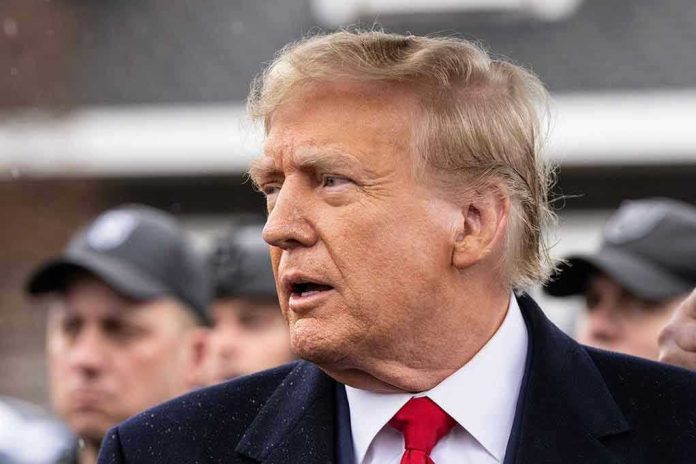
The real shock is not that Donald Trump is calling the shots from outside the Oval Office, but that his grip on the GOP can freeze Congress on one of the most explosive scandals of our era—Jeffrey Epstein’s secrets.
Story Snapshot
- Donald Trump directly intervenes, summoning Rep. Lauren Boebert and other GOP allies to block a congressional vote on Epstein-related documents.
- Trump’s enduring influence over the Republican Party shapes legislative moves even after his presidency.
- The fight centers on public transparency versus partisan maneuvering in the long-shadowed Epstein saga.
- The controversy exposes deepening fractures within the GOP and public frustration over elite accountability.
Trump’s Direct Intervention Disrupts Congressional Proceedings
President Donald Trump did not simply issue a statement from Mar-a-Lago. He picked up the phone, targeting Rep. Lauren Boebert and other House GOP hardliners to block a scheduled vote on investigating or releasing more Jeffrey Epstein documents. The timing was strategic: early November 2025, just as House leaders prepared to act on a measure that had both public and bipartisan interest. Trump’s move was not subtle. He demanded party discipline, risking public backlash to protect GOP unity and, possibly, his own legacy’s proximity to the Epstein firestorm.
Within days, Boebert and her cohort publicly announced their intent to torpedo the measure. Their rationale? They called it a “politically motivated” ploy, suggesting it served Democrats’ interests rather than true justice. The result was immediate: the vote stalled, and the chamber’s temperature spiked. Trump’s intervention, supported by a pointed Truth Social post, signaled a level of direct ex-presidential control the GOP has rarely witnessed—especially on an issue fraught with elite names and unanswered questions.
Why the Epstein Case Still Haunts Washington
The Epstein saga is no ordinary scandal. Since 2019, the financier’s arrest, jailhouse death, and the swirl of conspiracy theories have kept the public and Congress locked in a cycle of suspicion and demand for transparency. Epstein’s connections to powerful figures—including, at times, Trump himself—have only raised the stakes. When new revelations emerged in 2024, momentum built for the House to act, with Democrats and a handful of Republicans pressing for more sunlight on sealed records. The November 2025 vote was supposed to be a watershed moment for elite accountability. Instead, it has become a showcase for partisan trench warfare and executive muscle-flexing.
Congress has seen high-profile votes on transparency before—the Mueller Report, JFK files—all of which came with partisan overlays. But few had the combustible combination of public outrage, media obsession, and the unresolved mystery that defines the Epstein case. The demand for answers is not going away, and every delay only feeds cynicism and conspiracy on both the right and left.
Inside the GOP: Tensions, Calculations, and Risks
The House Republican caucus now faces a dilemma. Trump’s direct involvement puts enormous pressure on lawmakers who owe their political fortunes to his endorsement. Figures like Boebert become de facto proxies, leading the charge under the banner of loyalty and conservative values. Meanwhile, GOP leadership must navigate the treacherous waters between Trump’s demands, the interests of their institution, and the expectations of constituents who want transparency. Democrats have seized the moment, framing the episode as a test of government accountability and a referendum on the GOP’s willingness to confront uncomfortable truths.
The risks extend beyond political optics. Blocking the vote could erode public trust in Congress and set a precedent for ex-presidential interference in legislative affairs. Legal scholars warn that politicizing high-profile criminal cases undermines the very principle of oversight. Ethics experts caution that today’s maneuvering may hamstring future investigations into government or elite misconduct. For the GOP, internal fractures are widening, as some members quietly express concern over being seen as obstructionists in such a publicly charged case.
What Comes Next: Transparency or Turmoil?
The measure’s fate remains uncertain. With negotiations dragging on and media scrutiny intensifying, every move is magnified. Victims and their advocates are frustrated, feeling that justice is again being sacrificed for political expediency. For the wider public, the episode is another bitter lesson in how power—wielded from the golf course or the House floor—can slow the march toward truth. As the 2026 midterms loom, both parties are calculating the long-term implications. The only certainty: the questions swirling around Epstein, elite networks, and accountability will not be buried, no matter how many votes are blocked or delayed.
In this ongoing drama, Trump’s command over the GOP is as much the story as the Epstein case itself. The fight for transparency, and for control over the narrative, is far from over.
Sources:
The New York Times, “Trump Presses GOP to Block Epstein Vote,” Nov 2025
Politico, “Boebert Leads GOP Push Against Epstein Resolution,” Nov 2025
AP News, “House Delays Epstein Vote Amid GOP Resistance,” Nov 2025
Brookings Institution, “Trump’s Post-Presidency Influence,” 2025

